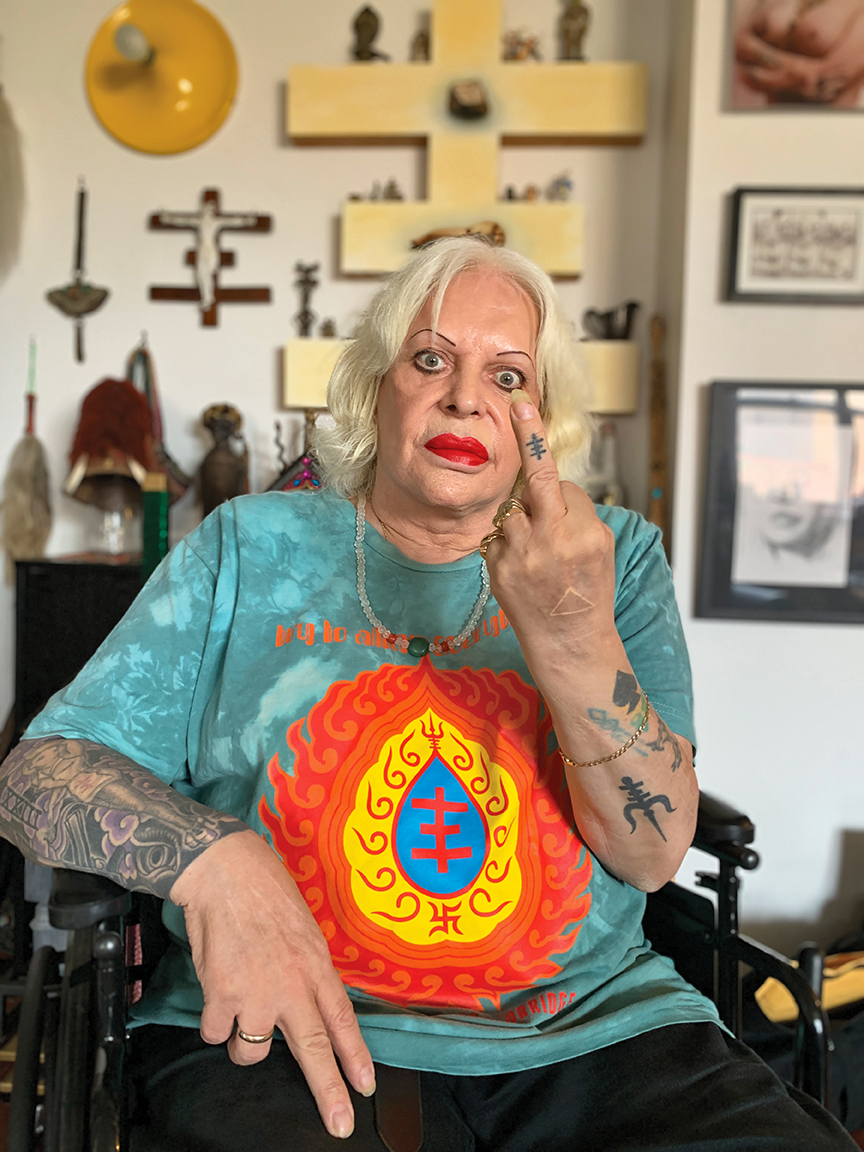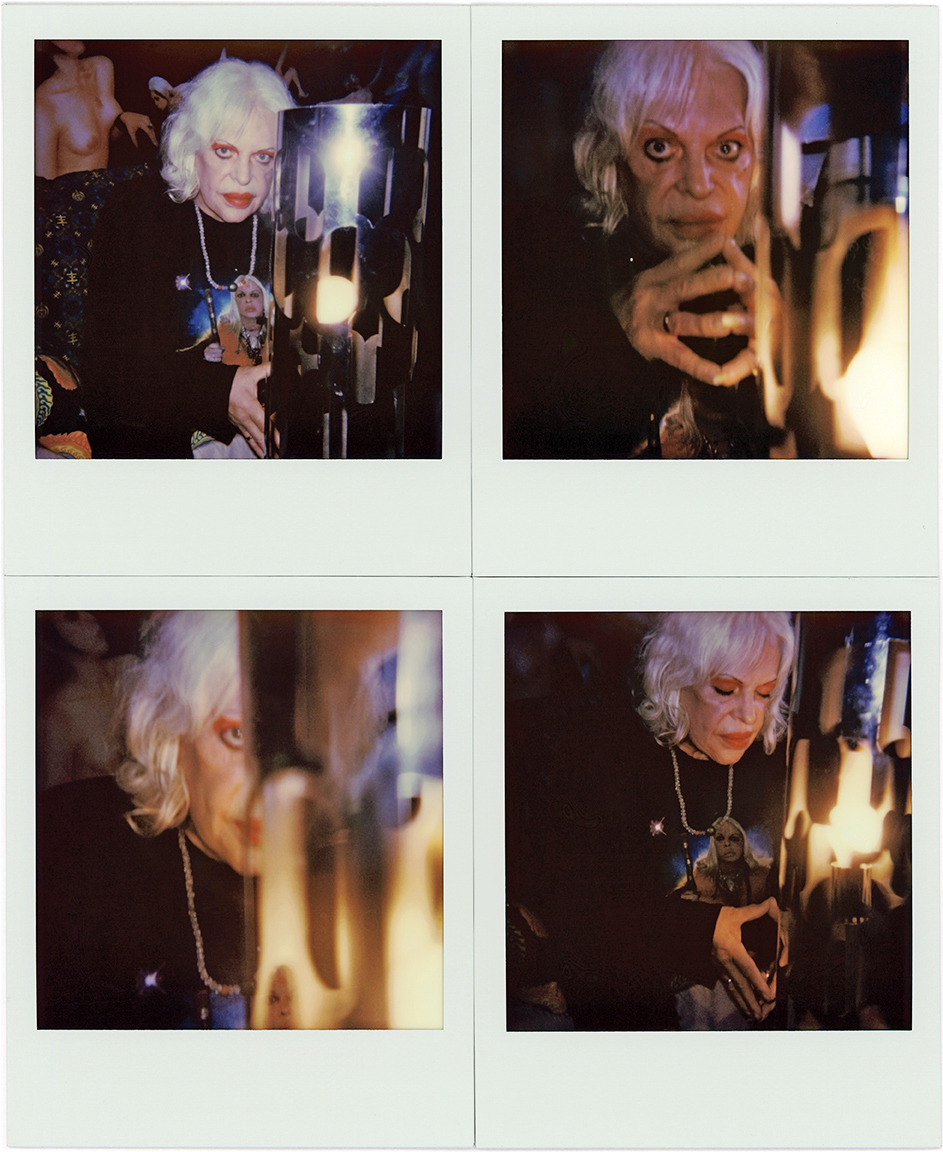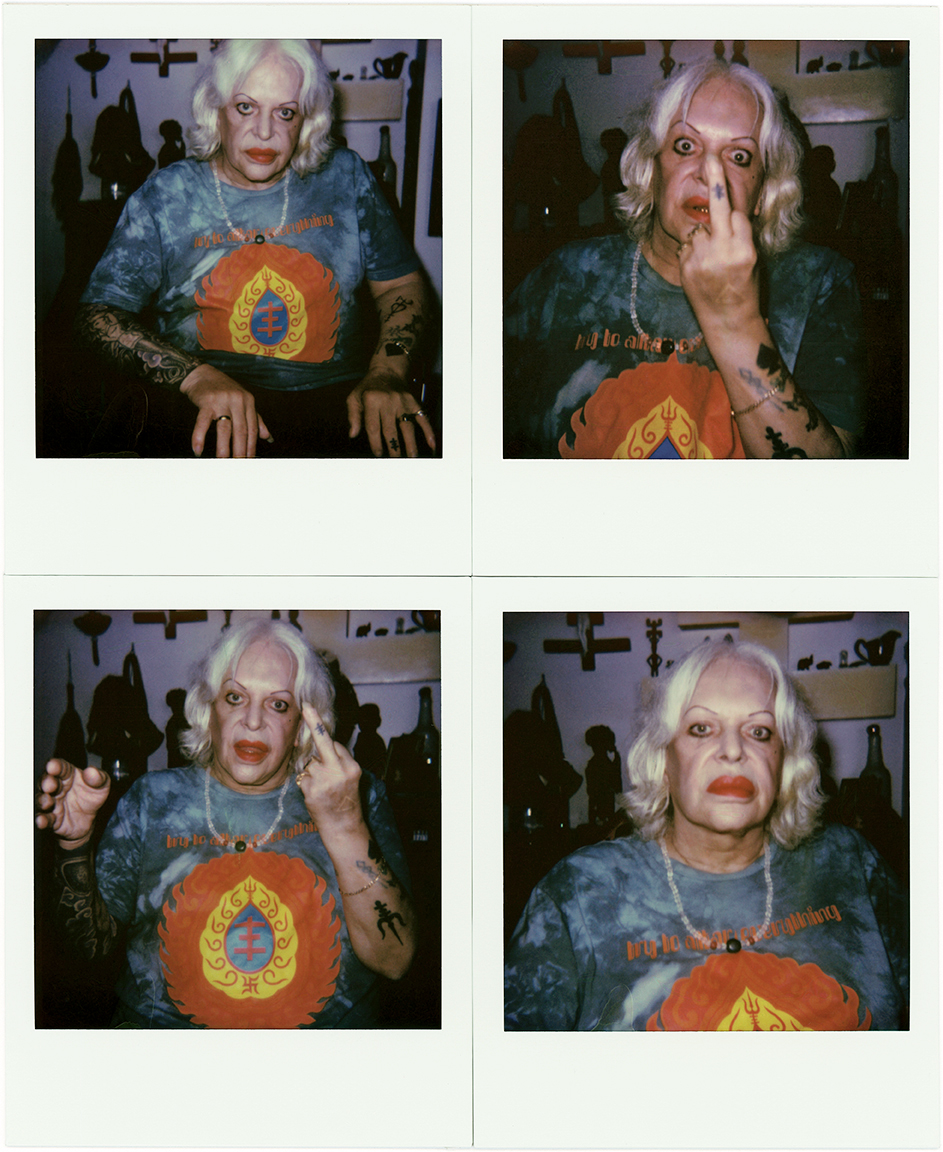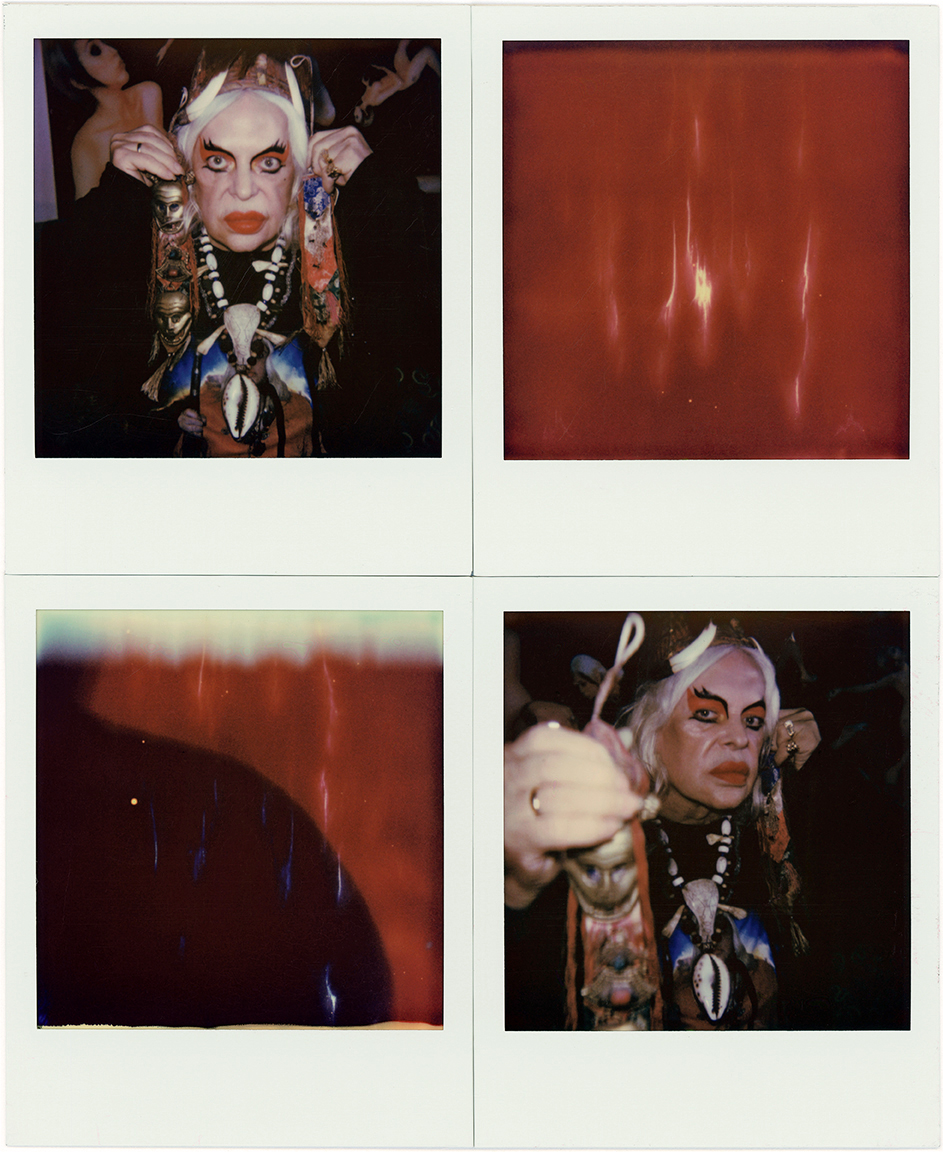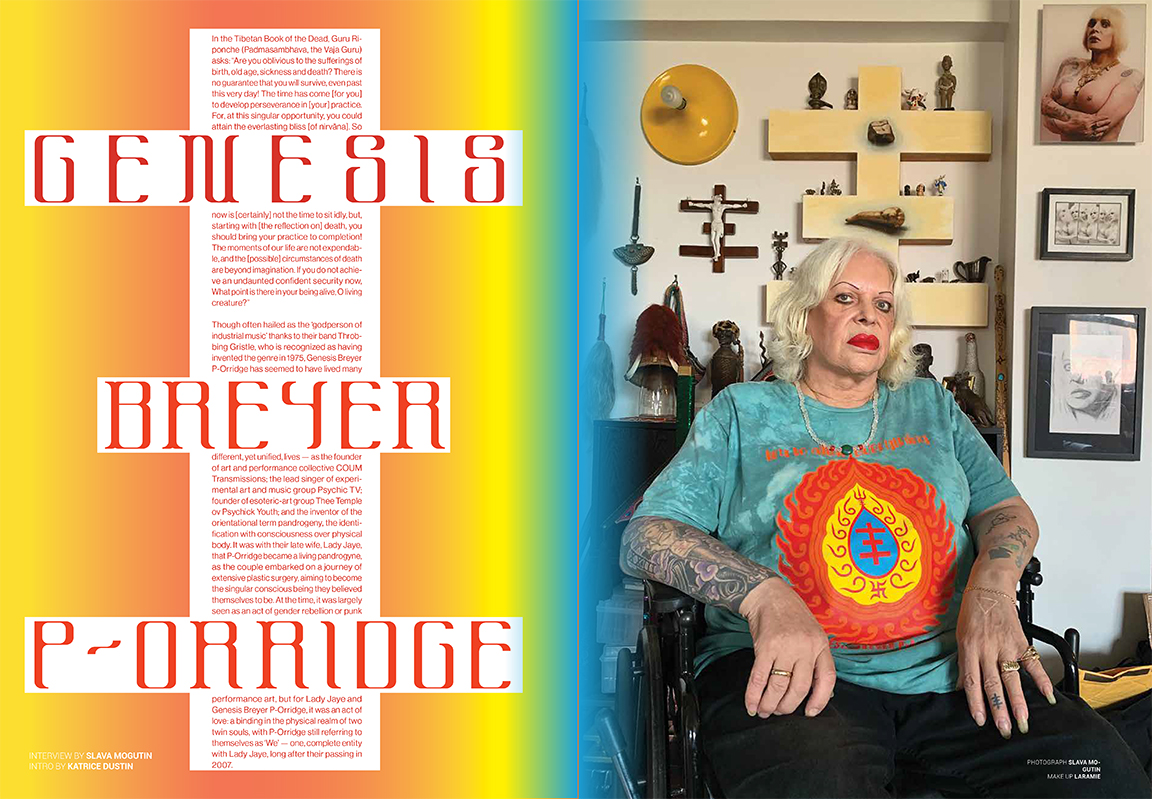
In the Tibetan Book of the Dead, Guru Riponche (Padmasambhava, the Vaja Guru) asks: “Are you oblivious to the sufferings of birth, old age, sickness and death? There is no guarantee that you will survive, even past this very day! The time has come [for you] to develop perseverance in [your] practice. For, at this singular opportunity, you could attain the everlasting bliss [of nirvāna]. So now is [certainly] not the time to sit idly, but, starting with [the reflection on] death, you should bring your practice to completion! The moments of our life are not expendable, and the [possible] circumstances of death are beyond imagination. If you do not achieve an undaunted confident security now, What point is there in your being alive, O living creature?”
Though often hailed as the ‘godperson of industrial music’ thanks to their band Throbbing Gristle, who is recognized as having invented the genre in 1975, Genesis Breyer P-Orridge has seemed to have lived many different, yet unified, lives — as the founder of art and performance collective COUM Transmissions; the lead singer of experimental art and music group Psychic TV; founder of esoteric art group Thee Temple ov Psychick Youth; and the inventor of the orientational term pandrogeny, the identification with consciousness over physical body. It was with their late wife, Lady Jaye, that P-Orridge became a living pandrogyne, as the couple embarked on a journey of extensive plastic surgery, aiming to become the singular conscious being they believed themselves to be. At the time, it was largely seen as an act of gender rebellion or punk performance art, but for Lady Jaye and Genesis Breyer P-Orridge, it was an act of love: a binding in the physical realm of two twin souls, with P-Orridge still referring to themselves as ‘We’ — one, complete entity with Lady Jaye, long after their passing in 2007.
No stranger to controversy, and adamantly defiant in not allowing themselves to be pigeon-holed under any conventional societal label, it is agreed that P-Orridge considers themselves an artist above all — armed with the belief that art and life are intrinsically linked, ultimately encased together and fundamentally inseparable in nature. Running in social circles with the likes of the late Beats William S. Burroughs and Brion Gysin (the latter whose work P-Orridge published an extensive book chronicling, entitled His Name Was Master), they sought to design their own model of living, through the creation of a unique linguistic, ‘cut-up’ hyper-text, a process which they believed essential to the creation of the ‘third mind’, one that exists within the process of creative collaboration between individuals.
Whichever way their life and work is seen, P-Orridge has successfully built an existence defined by unbounding possibilities, in which extremes are not feared, but welcomed. As they near the end of their life in the face of terminal Leukemia, Genesis Breyer P-Orridge leaves behind a legacy which will be perceived differently depending on who you speak to and on which end of the political spectrum: as a spiritual leader, gender revolutionist, human rights activist, writer, artistic and musical pioneer, societal agitator, and in their own words, an “OCCULTURAL ENGINEER”.
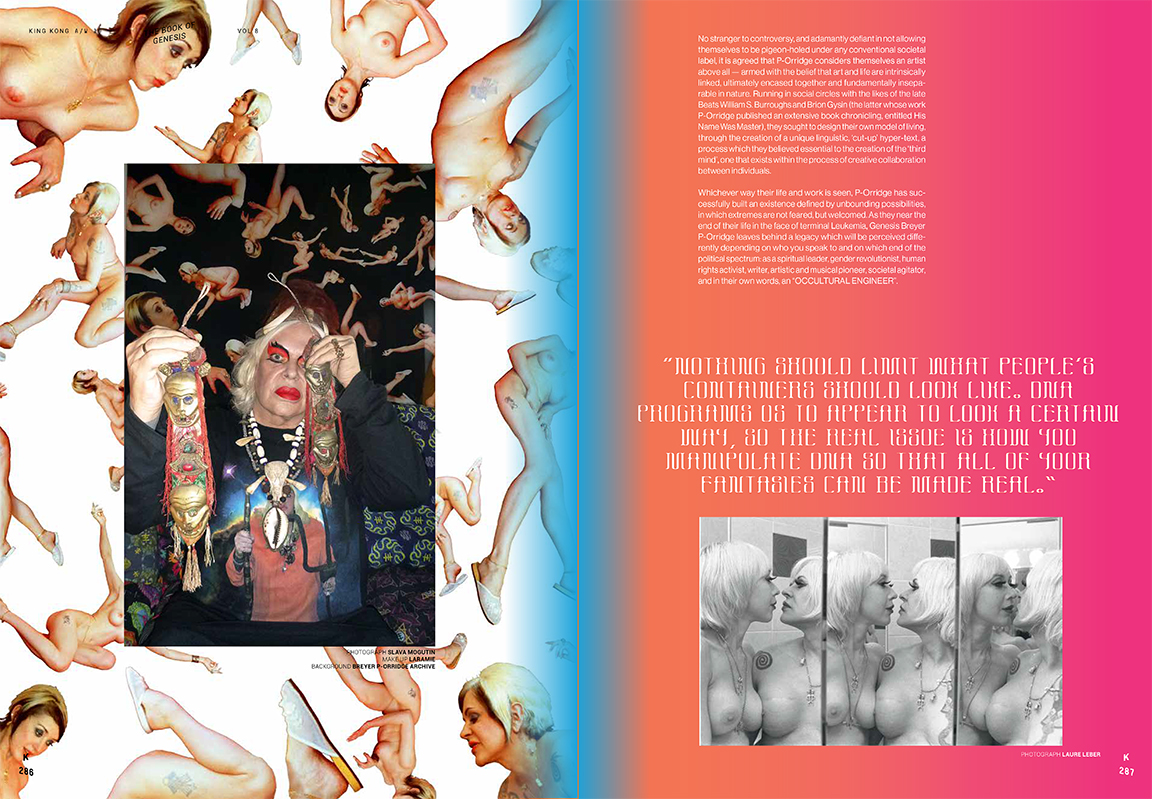
“NOTHING SHOULD LIMIT WHAT PEOPLE’S CONTAINERS SHOULD LOOK LIKE.
DNA PROGRAMS US TO APPEAR TO LOOK A CERTAIN WAY, SO THE REAL ISSUE IS HOW YOU
MANIPULATE DNA SO THAT ALL OF YOUR FANTASIES CAN BE MADE REAL.”
Slava Mogutin: I want to ask first and foremost about your experience being exiled from the UK. How did this inform your work and affect your life in general?
Genesis Breyer P-Orridge: In 1991, I was forced into exile by the Scotland Yard and the establishment. Wild, absurd accusations had been made in tabloid newspapers, including a one-hour ‘Special TV Documentary’ that the authorities later admitted to being 100% fabricated. My civil rights lawyers warned me that they had been told by Scotland Yard that they could not guarantee my safety if I returned to the UK. My lawyers said they asked if they were saying my life was in real danger, which got a less than cryptic reply: ‘Yes, he might be killed.’
So I went to the exiled Tibetan lama, Dzongsar Khyentse Rinpoche, that had been giving me Buddhist teachings and said, ‘You’re a refugee — you can’t live in Tibet and worship there and now I can’t be in England and speak my mind freely. I am a refugee in exile now too. Where should I go?’ He said, ‘America, right away!’ And I said, ‘No, please, I don’t like America.’ But he just laughed and said, ‘You’re supposed to go there.’
I have to confess that I’m a little ashamed of this now, but at the time I thought I needed a second opinion. So I went to speak to Pagalananda — which means ‘Crazy Holy One’ — who was the primary Aghori Baba. Aghori follow the Path of No Distinction. They believe that all tastes and judgements of anything’s value are arbitrary. Essentially, there is nothing which establishes that grilled chicken tastes better than eating human shit.
Whatever you’re taught is a culinary delicacy through family, society, custom, and religion is what you believe. All judgements are imposed and incorrect. Conceptually, there is no better or worse — everything is equal. There is no morality because there is no real world. It just seems to exist primarily by common agreement. So I went to see Pagalananda in his cave and said to him, ‘Bom Shiva, Pagalananda, I cannot go home, where should I go?’ And he said, ‘You MUST go to the United States.’
So, I thought about it. Myself, both of my children and their mother were suddenly stranded in a small room in the VAJRA HOTEL in Kathmandu in 1991. Everything we ever had was gone — all we had was one suitcase. I remembered that my Tibetan teacher, Dzongsar, whose Nepal monastery was near Tibet in the Himalayas, had been telling me he was worried that the monks were cutting down too many trees for heating and cooking. The only way to solve this was to buy a small hydro-electric system that would generate enough electricity to cook and light the monastery, but it was 5000 pounds and they didn’t have any money.
Then I remembered that we had just gotten a gold American Express card before we left England which had a limit of exactly 5000 pounds. I went to this shady currency dealer and said, ‘If I give you this card, will you give me 5000?’ He accepted. In those days, before computers, it would take 6 months before the bank in England discovered that no one was ever gonna pay the bill. And so he gave me 5000 in cash in exchange for the card, and I gave that cash to Dzongsar to pay for a hydro-electric scheme. I donated my only financial safety net. Then I really had nothing. It was a test of my belief that I must trust fate and relinquish control of my life. It seemed that something very important was upon me. So my next question was how were we going to get to the United States. I rang up Wax Trax records, who were releasing Psychic TV albums on my Temple Records label, and asked if they would front money for one way tickets for me and my family to get to the US. They said yes. And that’s how it happened. Our friends Michael Horowitz and Cindy Palmer — Winona Ryder’s parents — met us at San Francisco airport and took us to Petaluma where we swapped a small hotel room in Kathmandu for Winona’s old bedroom.
It’s very strange to suddenly realize that the people who have the most power in your home country — the rich and, in the case of Britain, the aristocratic establishment and the secret political cabals — are prepared to destroy you using the media as a weapon. You are no longer welcome in the country of your birth and if you go back, your life has been threatened. That is, unless you’re not just killed immediately. It’s a heavy thing to discover. And all because of the things I thought and said. There was a moment in the late ‘60s and ‘70s where it seemed the human species was waking up to some kind of common sense. You know, I had worked with gay liberation, women’s rights, a right to natural birthing, squatter’s rights, anti-apartheid, animal rights, tattooing and piercing rights and even pagan rights. I had worked with all these different movements which were truly trying to make ALL people more equal.
SM: And while in Kathmandu, you also ran a soup kitchen...
GBP: Yeah. My family and I worked with a soup kitchen in Kathmandu every day. We got up at about 6AM each morning and helped the monks cook huge tureens of rice and dahl on some derelict land at Boudenath Stupa. Anybody who sat around the stupa would receive rice and dahl, plus pure drinking water. Both my daughters, Caresse and Genesse, 9 and 6 at the time, helped their mother and me do this twice a day. Up to 300 lepers, beggars and Tibetan refugees were given clean water and decent food. Psychic TV fans and TOPY (Thee Temple ov Psychick Youth) had donated children and baby clothes to help refugees get through the winter. When you are around people with no fingers from leprosy, and they’re blind and they’ve got half a leg, you really DO remember how fortunate you are. Through that experience of dealing with people who have less than nothing, my personal experience didn’t hurt as much as it might have. I said to myself, ‘All those pretty things — they mean nothing. What matters is that I’m still alive.’ And of all places, the United States welcomed my family, and has always welcomed me, as it was supposed to. It’s all very vivid again to me now because my fiancé, Susana Vico Valero, is currently being refused a visa for 20 months to come be with me here while I fight my cancer.
“THE MIND IS WHAT CAN LOVE. THE MIND IS WHAT CAN COME UP WITH NEW IDEAS. THE MIND IS WHAT CAN SHAPE CULTURE.”
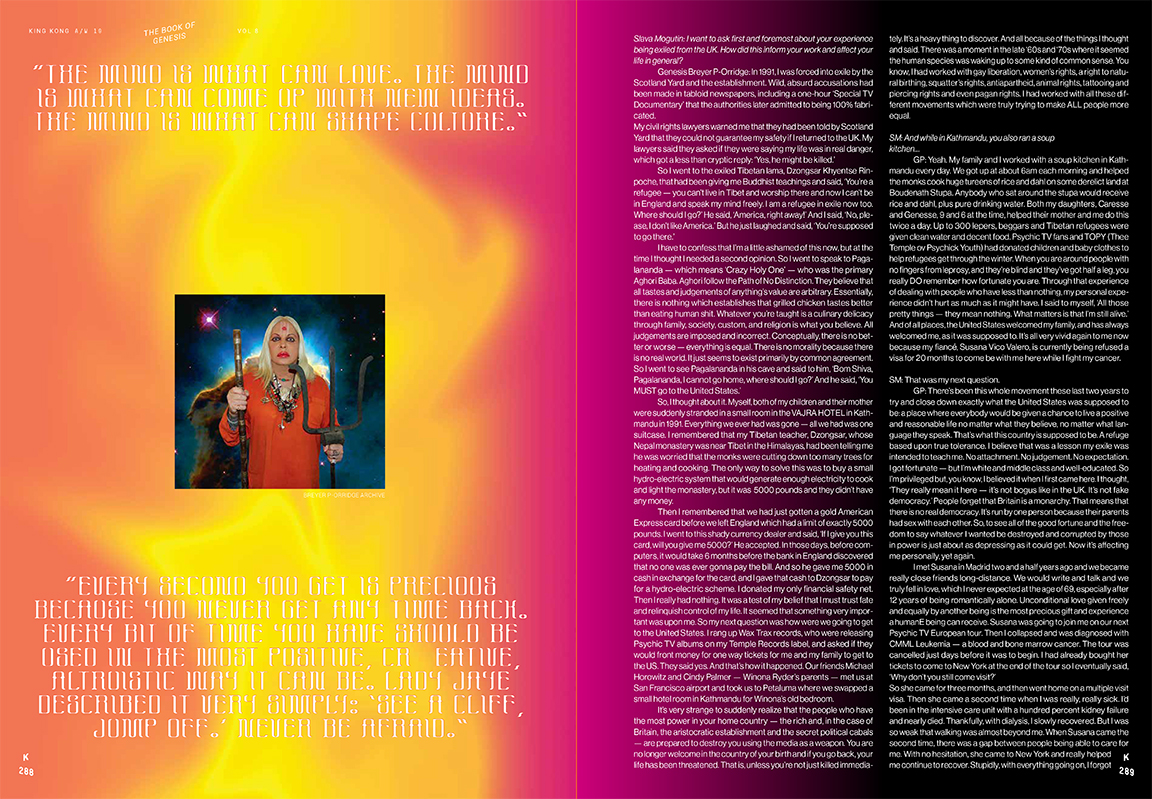
“EVERY SECOND YOU GET IS PRECIOUS BECAUSE YOU NEVER GET ANY TIME BACK. EVERY BIT OF TIME YOU HAVE SHOULD BE USED IN THE MOST POSITIVE, CREATIVE, ALTRUISTIC WAY IT CAN BE. LADY JAYE DESCRIBED IT VERY SIMPLY: ‘SEE A CLIFF, JUMP OFF.’ NEVER BE AFRAID.”
SM: That was my next question.
GBP: There’s been this whole movement these last two years to try and close down exactly what the United States was supposed to be: a place where everybody would be given a chance to live a positive and reasonable life no matter what they believe, no matter what language they speak. That’s what this country is supposed to be. A refuge based upon true tolerance. I believe that was a lesson my exile was intended to teach me. No attachment. No judgement. No expectation. I got fortunate — but I’m white and middle class and well-educated. So I’m privileged but, you know, I believed it when I first came here. I thought, ‘They really mean it here — it’s not bogus like in the UK. It’s not fake democracy.’ People forget that Britain is a monarchy. That means that there is no real democracy. It’s run by one person because their parents had sex with each other. So, to see all of the good fortune and the freedom to say whatever I wanted be destroyed and corrupted by those in power is just about as depressing as it could get. Now it’s affecting me personally, yet again.
I met Susana in Madrid two and a half years ago and we became really close friends long-distance. We would write and talk and we truly fell in love, which I never expected at the age of 69, especially after 12 years of being romantically alone. Unconditional love given freely and equally by another being is the most precious gift and experience a humanE being can receive. Susana was going to join me on our next Psychic TV European tour. Then I collapsed and was diagnosed with CMML Leukemia — a blood and bone marrow cancer. The tour was cancelled just days before it was to begin. I had already bought her tickets to come to New York at the end of the tour so I eventually said, ‘Why don’t you still come visit?’
So she came for three months, and then went home on a multiple visit visa. Then she came a second time when I was really, really sick. I’d been in the intensive care unit with a hundred percent kidney failure and nearly died. Thankfully, with dialysis, I slowly recovered. But I was so weak that walking was almost beyond me. When Susana came the second time, there was a gap between people being able to care for me. With no hesitation, she came to New York and really helped me continue to recover. Stupidly, with everything going on, I forgot to change her ticket. When she got home, she was informed that her visa has been canceled. It is the stupidest mistake of my life. But I was critically ill and struggling to survive. I still weep about this at some point every day.
SM: So she overstayed her visa...
GBP: Accidentally — by 9 days. It’s been 18 months now and it doesn’t matter how many letters we get from amazing people asking to reinstate Susana’s visit visa — my Oncology doctors, my congresswoman Nydia Velazquez who is wonderful, or from all my friends. She goes to the embassy in Madrid and they just say no. It really sucks when you’ve got no ill-feeling, no secret agenda to stay or take somebody’s job — you just want to be with the person you love. And if it’s happening to me with my advantages, then my heart bleeds for the people that have nothing. Children in cages?! It’s like Auschwitz. The things going on now are shameful. There aren’t even words for what an abomination is taking place. It’s an absolute contradiction of everything I came to believe this nation is supposed to represent — supposedly the nation of COMMON sense, freedom of speech, freedom to be who you are, freedom to worship or not worship whatever you wish, the right to do as you wish with your own body. Basic stuff that should have been accepted for everybody at the very beginning of civilization. It’s being stripped away methodically across the globe to maintain POWER for those in CONTROL of societies.
Genesis with Brion Gysin's Dream Machine
William S. Burroughs said something simple yet so true and revealing. He said to me, 'Gen if you want to know WHY something is happening in politics, in business, in society, LOOK FOR THE VESTED INTEREST.' The media trickery that goes on to misinform people who might be poorly educated and/or don’t have access to accurate information... They’re being tricked into supporting the destruction of what was actually set up to help them too. They’re almost committing economic, philosophical suicide and the only people to benefit are the top of the one-percent. When I was sixteen in the ‘60s, my generation looked at the world and thought, ‘It doesn't need to be like this.’ Nations are an anathema because they create wars. They have territorial boundaries which create things that people desire: more power, more land. That causes suffering and war and millions die. Who stays safe other than that same point-one of the one-percent? They say, ‘Go fight, go get slaughtered for me, your king, your leader, whatever title they choose.’
It’s time for the human species to wake up. Those people have no power if we all laugh and turn our backs on them. You know, the best way to deal with Trump’s tweets is not report them but ignore them completely. They have no power if nobody reads them. We need new ways of thinking about how to conduct our lives.
The only way that I think we can solve this mess is slowly. If you see what’s happening and are appalled by the stupidity of the human species, then first you have the power to change your own rules. I like to say, ‘First change your SELF, then change your room, then change your home, then change your street, then change your town, then change your country.’ Incrementally, we CAN still stop this regression, but it requires no longer being greedy to own things — you have to truly share, share whatever resources you have, whatever tools, vehicles, land you have, whatever skills you have, whatever love or intelligence you have. If everybody did that, you’d get this incredible situation where sharing is a way of life. And when you look at it that way, you actually end up with more.
If there are 7 of you and 4 of you own homes, perhaps in different states or countries, then you ALL have keys to them and suddenly you have multiple options for where to live. These tiny units of activist collectives — I call them a COUMUNITY — these small, chosen families are a positive way of trying to do life which can be preserved and is an example of a much more satisfying and enlightening form of living.
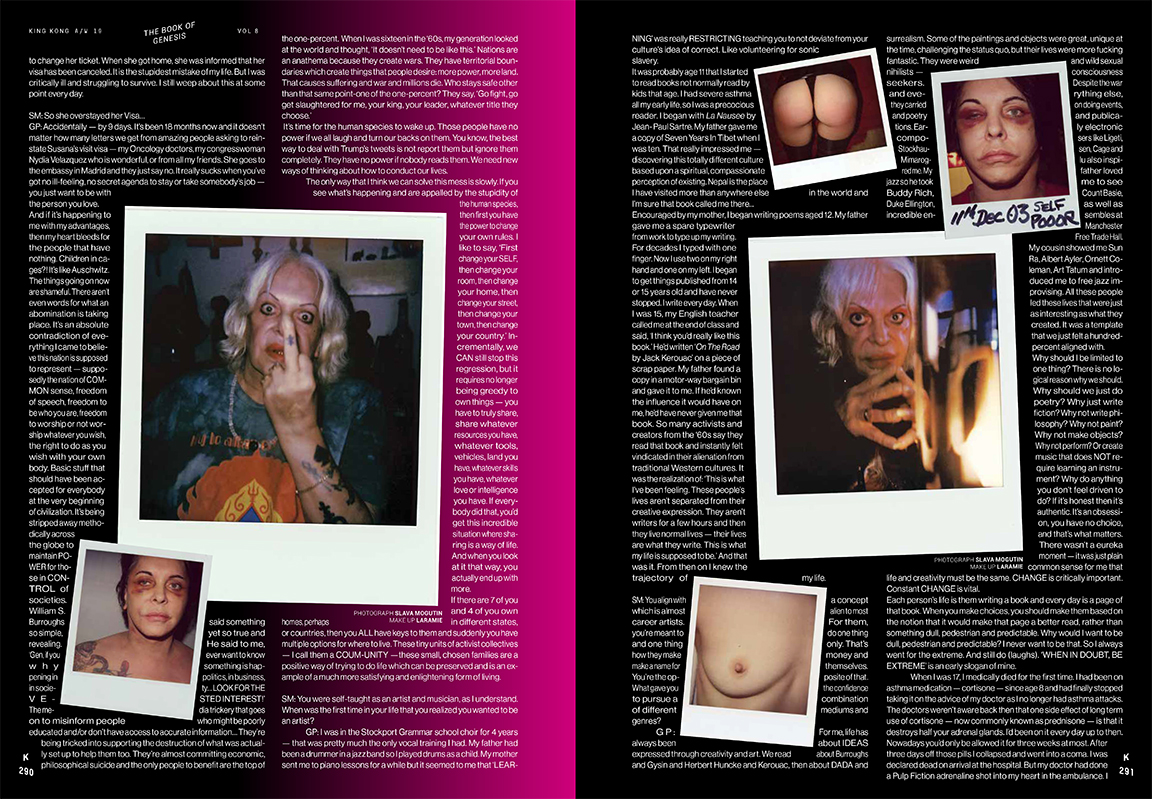
SM: You were self-taught as an artist and musician, as I understand. When was the first time in your life that you realized you wanted to be an artist?
GBP: I was in the Stockport Grammar school choir for 4 years — that was pretty much the only vocal training I had. My father had been a drummer in a jazz band so I played drums as a child. My mother sent me to piano lessons for a while but it seemed to me that ‘LEARNING’ was really RESTRICTING teaching you to not deviate from your culture’s idea of correct. Like volunteering for sonic slavery.
It was probably age 11 that I started to read books not normally read by kids that age. I had severe asthma all my early life, so I was a precocious reader. I began with La Nausee by Jean-Paul Sartre. My father gave me a copy of Seven Years In Tibet when I was ten. That really impressed me — discovering this totally different culture based upon a spiritual, compassionate perception of existing. Nepal is the place I have visited more than anywhere else in the world and I'm sure that book called me there... Encouraged by my mother, I began writing poems aged 12. My father gave me a spare typewriter from work to type up my writing. For decades I typed with one finger. Now I use two on my right hand and one on my left. I began to get things published from 14 or 15 years old and have never stopped. I write every day.
When I was 15, my English teacher called me at the end of class and said, ‘I think you’d really like this book.’ He’d written ‘On The Road by Jack Kerouac’ on a piece of scrap paper. My father found a copy in a motorway bargain bin and gave it to me. If he’d known the influence it would have on me, he’d have never given me that book. So many activists and creators from the ‘60s say they read that book and instantly felt vindicated in their alienation from traditional Western cultures. It was the realization of: ‘This is what I’ve been feeling. These people’s lives aren’t separated from their creative expression. They aren’t writers for a few hours and then they live normal lives — their lives are what they write. This is what my life is supposed to be.’ And that was it. From then on I knew the trajectory of my life.
SM: You align with a concept which is almost alien to most career artists. For them, you're meant to do one thing and one thing only. That's how they make money and make a name for themselves. You're the opposite of that. What gave you the confidence to pursue a combination of different mediums and genres?
GBP: For me, life has always been about IDEAS expressed through creativity and art. We read about Burroughs and Gysin and Herbert Huncke and Kerouac, then about DADA and surrealism. Some of the paintings and objects were great, unique at the time, challenging the status quo, but their lives were more fucking fantastic.
They were weird and wild sexual nihilists — consciousness seekers. Despite the war and everything else, they carried on doing events and poetry and publications. Early electronic composers like Ligeti, Stockhausen, Cage and Mimaroğlu also iunspired me. My father loved jazz so he took me to see Buddy Rich, Count Basie, Duke Ellington, as well as incredible ensembles at Manchester Free Trade Hall.
My cousin showed me Sun Ra, Albert Ayler, Ornette Coleman, Art Tatum and introduced me to free jazz improvising. All these people led these lives that were just as interesting as what they created. It was a template that we just felt a hundred-percent aligned with. Why should I be limited to one thing? There is no logical reason why we should. Why should we just do poetry? Why just write fiction? Why not write philosophy? Why not paint? Why not make objects? Why not perform? Or create music that does NOT require learning an instrument? Why do anything you don’t feel driven to do? If it’s honest then it’s authentic. It’s an obsession, you have no choice, and that’s what matters. There wasn’t a eureka moment — it was just plain common sense for me that life and creativity must be the same. CHANGE is critically important. Constant CHANGE is vital.
Each person’s life is them writing a book and every day is a page of that book. When you make choices, you should make them based on the notion that it would make that page a better read, rather than something dull, pedestrian and predictable. Why would I want to be dull, pedestrian and predictable? I never want to be that. So I always went for the extreme. And still do (laughs). ‘WHEN IN DOUBT, BE EXTREME’ is an early slogan of mine.
When I was 17, I medically died for the first time. I had been on asthma medication — cortisone — since age 8 and had finally stopped taking it on the advice of my doctor as I no longer had asthma attacks. The doctors weren’t aware back then that one side effect of long term use of cortisone — now commonly known as prednisone — is that it destroys half your adrenal glands. I’d been on it every day up to then. Nowadays you’d only be allowed it for three weeks at most. After three days off those pills I collapsed and went into a coma. I was declared dead on arrival at the hospital. But my doctor had done a Pulp Fiction adrenaline shot into my heart in the ambulance. I recall floating above my body in the hospital with doctors discussing, ‘Who is going to tell the parents he’s dead?’ But I came back. The doctor explained, ‘This is all new for us, so we don’t really know what your life expectancy is after this. You could drop dead any day or you could live a normal length of time.’ And I remember thinking, ‘Thank you.’ Because now there was no excuse to put off being creative and living art. Of course, nobody knows how many days they have left. Every second you get is precious because you never get any time back. Every bit of time you have should be used in the most positive, creative, altruistic way it can be. Lady Jaye described it very simply: ‘See a cliff, jump off.’ Never be afraid. Any instilled attachment to fulfilling my parents’ dreams for me or society’s expectations of a traditional, good citizen contribution from me, ended that day.
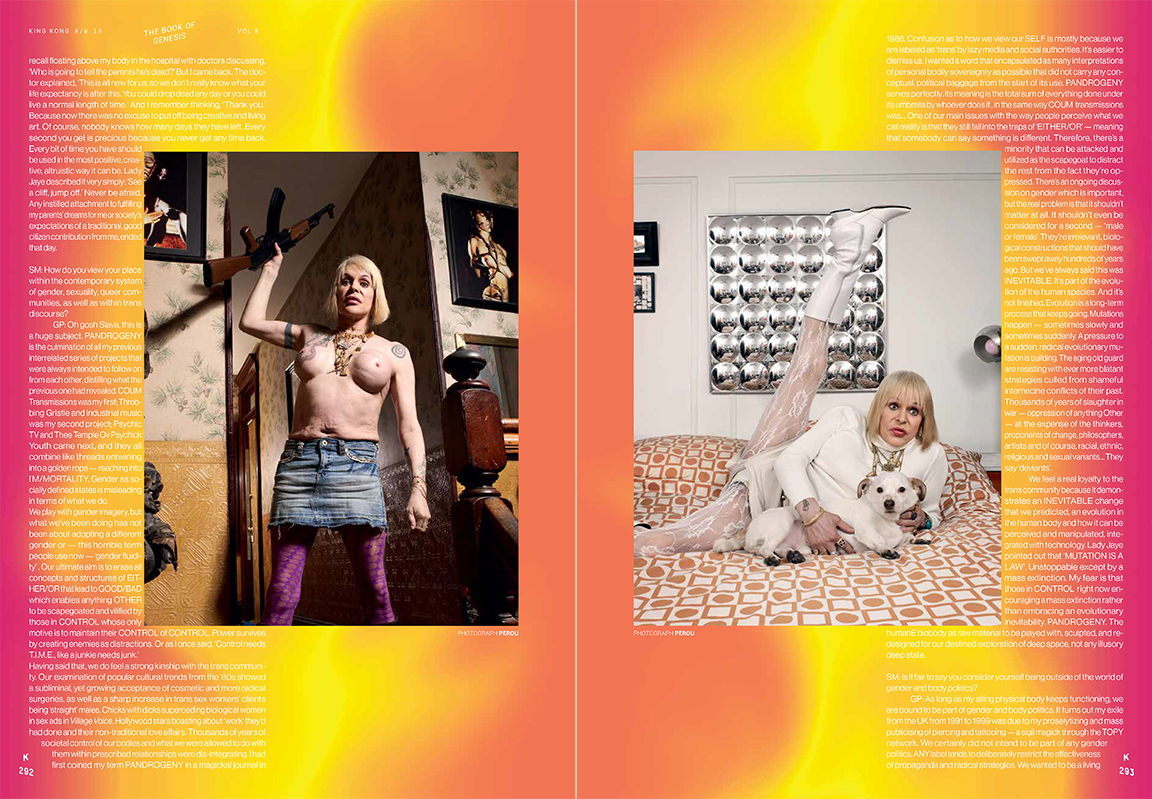
SM: How do you view your place within the contemporary system of gender, sexuality, queer communities, as well as within trans discourse?
GBP: Oh gosh, Slava, this is a huge subject. PANDROGENY is the culmination of all my previous interrelated series of projects that were always intended to follow on from each other, distilling what the previous one had revealed. COUM Transmissions was my first; Throbbing Gristle and industrial music was my second project; Psychic TV and Thee Temple Ov Psychick Youth came next, and they all combine like threads entwining into a golden rope — reaching into I’M/MORTALITY. Gender as socially defined states is misleading in terms of what we do. We play with gender imagery, but what we’ve been doing has not been about adopting a different gender or — this horrible term people use now — ‘gender fluidity’ . Our ultimate aim is to erase all concepts and structures of EITHER/OR that lead to GOOD/BAD which enables anything OTHER to be scapegoated and vilified by those in CONTROL whose only motive is to maintain their CONTROL of CONTROL. Power survives by creating enemies as distractions. Or as I once said, 'Control needs T.I.M.E., like a junkie needs junk.'
Having said that, we do feel a strong kinship with the trans community. Our examination of popular cultural trends from the ‘80s showed a subliminal, yet growing acceptance of cosmetic and more radical surgeries, as well as a sharp increase in trans sex workers’ clients being ‘straight’ males. Chicks with dicks superceding biological women in sex ads in Village Voice. Hollywood stars boasting about ‘work’ they’d had done and their non-traditional love affairs. Thousands of years of societal control of our bodies and what we were allowed to do with them within prescribed relationships were disintegrating. I had first coined my term PANDROGENY in a magickal journal in commentary on the humanE biobody and the way people have been encouraged to limit their imaginations when looking at the potential of their own bodies. With PANDROGENY, we used to say, ‘Some people think they’re a man trapped in a woman’s body, some people feel they’re a woman trapped in a man’s body, but the PANDROGYNE just feels trapped in a body.’ The PANDROGYNE doesn’t just think, ‘I want to have breasts.’ It’s more a question of, ‘Why can’t I have those? They add to sexual experience. We want everything.’ Or they symbolise my rejection of masculine tropes, which I do find obnoxious on the whole. For me, that was a strong motive to separate from maleness as I experienced it...
But later, as you free your perceptions, then you think, ‘But I also want gills so I can live underwater, I want fur so I don’t need to wear clothes in the winter, and I wanna grow horns and have a mustache.’ Lady Jaye always wanted to grow facial hair. She used to put on fake mustaches and sideburns. Nothing should limit what people’s containers should look like . DNA programs us to look a certain way , so the real issue is how you manipulate DNA so all of your fantasies can be made real. We knew PANDROGENY was INEVITABLE; that a breakdown of the normal binary idea was going to happen and that it would be revolutionary. What we should be saying is, ‘This is the bio-body that I happened to be born in, but I am not this body. I am this consciousness that resides in this body. The body is not me.’
That said, we can use the body as propaganda and as a form of leverage within society to confuse those who disagree. But it’s just as Lady Jaye nailed it: ‘The humanE body is a cheap suitcase.’ That cheap suitcase contains the actual YOU which is your consciousness. That consciousness, prior to bio body life, during bio-body life and after entropy and dissolution (death) of the bio-body, is always connected to all other consciousness, outside time and space, in perpetuity. Most religions in the world tend to suggest that the body is sacred. It’s not. Lady Jaye was a nurse and she loved being in the operating theater because she said it reminded her that we’re just meat and bones. When they cut you open, they use scissors and hammers and nails and screwdrivers and glue and staples and stick bits in and cut bits out. She thought it was primitive — akin to being in a butcher shop. There’s nothing sacred there, nothing. But with the mind, there is. The mind is what can love, the mind is what can come up with new ideas . The mind is what can shape culture.
SM: You’ve mentioned that creating artwork isn’t something you do in order to sell or show it. Does this mean you wouldn’t consider yourself a career artist? How do you feel when people place commercial value on your work?
GBP: The artworld stinks. It’s just become Wall Street really: investment and profit. We try not to think about that. We try to ignore it because it’s too alien. We know that in a sense it’s a necessity, because we do feel like sharing some of what we create. Especially if it might trigger new thoughts in a viewer or generate a change. When COUM Transmissions became mainstream to a degree and COULD have become a predictable career, say parallel to Abramović or Gilbert & George, I stopped it to avoid that happening. Instead, I began Throbbing Gristle, where once more we began with almost no traditional qualifications. Our collages from the ‘70s were unseen in any art context until 30 years after we made them. My first paintings from 1966-67 have still never been shown. We gave half away to friends and strangers. We’re only trying to make public ideas that we feel are worthy of consideration by our species, or specific demographics or tribes, and we’d been right several times.
SM: You coined the term ‘industrial music’ — didn’t you? That was such a revolution in the industry. So many bands went on this commercial journey and basically took your idea and ran with it.
GBP: Yeah. For some reason we seem to be able to pick up on the undercurrents in the overriding culture more quickly and precisely than a lot of other people. It has enabled us to be ahead of the curve in terms of saying what’s going to happen next and what it might look like. To shape it and to hopefully make it available to people before it gets commercialized, before it gets controlled by corporations. We were right about industrial music when we said there’s another kind of music that’s INEVITABLE. We also said piercing and tattooing would be a global phenomenon. We predicted a resurgence of contemporary magical forms. We predicted PANDROGENY and radical new visions of the body, gender, and on and on. A magazine back in the 1980s asked me to sum up my occupation in two words. Without having ever knowingly thought of the words together before, we blurted out, ‘CULTURAL ENGINEER.’ Perhaps now we’d substitute OCCULTURAL ENGINEER. None of that means we thought of it first necessarily, though a few times we have. We prefer to believe these changes and shifts are in the zeitgeist. They are INEVITABLE, and somehow we’ve developed very sensitive antenna for spotting these very early. Once seen, we feel a duty to strategise how to manifest them out into this cultural matrix.
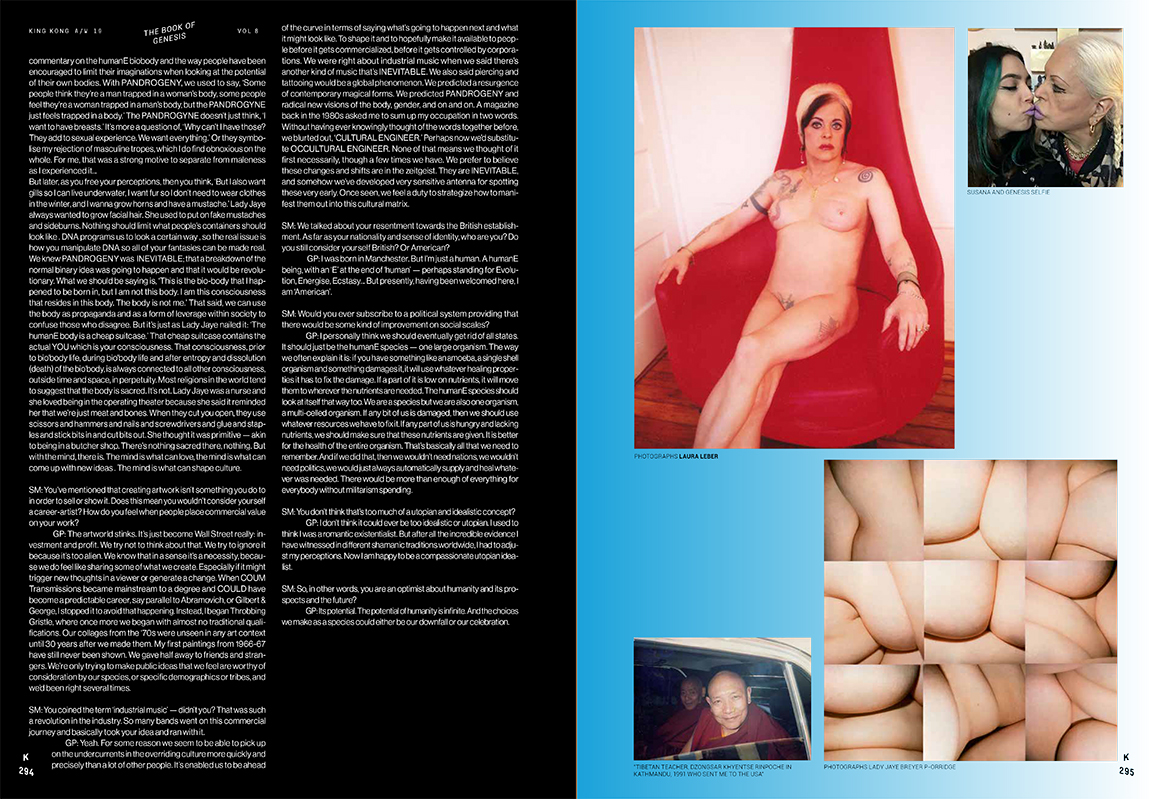
SM: We talked about your resentment towards the British establishment. As far as your nationality and sense of identity, who are you? Do you still consider yourself British? Or American?
GBP: I was born in Manchester. But I’m just a human. A humanE being, with an ‘E’ at the end of ‘human’ — perhaps standing for Evolution, Energise, Ecstasy... But presently, having been welcomed here, I am ‘American’.
SM: Would you ever subscribe to a political system providing that there would be some kind of improvement on social scales?
GBP: I personally think we should eventually get rid of all states. It should just be the humanE species — one large organism. The way we often explain it is: if you have something like an amoeba, a single shell organism and something damages it, it will use whatever healing properties it has to fix the damage. If a part of it is low on nutrients, it will move them to wherever the nutrients are needed. The humanE species should look at itself that way too. We are a species but we are also one organism, a multi-celled organism. If any bit of us is damaged, then we should use whatever resources we have to fix it. If any part of us is hungry and lacking nutrients, we should make sure that these nutrients are given. It is better for the health of the entire organism. That’s basically all that we need to remember. And if we did that, then we wouldn’t need nations, we wouldn’t need politics, we would just always automatically supply and heal whatever was needed. There would be more than enough of everything for everybody without militarism spending.
SM: You don’t think that’s too much of a utopian and idealistic concept?
GBP: I don’t think it could ever be too idealistic or utopian. I used to think I was a romantic existentialist. But after all the incredible evidence I have witnessed in different shamanic traditions worldwide, I had to adjust my perceptions. Now I am happy to be a compassionate utopian idealist.
SM: So, in other words, you are an optimist about humanity and its prospects and the future?
GBP: Its potential. The potential of humanity is infinite. And the choices we make as a species could either be our downfall or our celebration.
